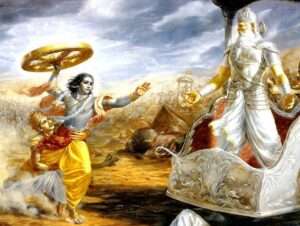The Ninth Day
Duryodhana seemed particularly excited that morning.
“This is the day of our victory,” he told his brother Duhssasana. “Our Bhishma assured me last night that he would do wonders today. We must protect him, especially from Shikhandi. Go, then, and place massive protection around him.”
Early in the morning Bhishma organized the army into a formation called sarvato-bhadra, impenetrable from any direction.
After taking note of his initiatives, the Pandavas settled their troops. And for the ninth time the fighting began.
The one who launched the first attack was Abhimanyu. Although the enemy formation was practically impenetrable for anyone, the boy in a few seconds crept into it and sowed panic. Abhimanyu was a great devotee of the Lord and was so elevated in spirituality that a halo of light constantly surrounded his beautiful face.
Drona, Kripa, Jayadratha, and Asvatthama all tried to stop him, but they couldn’t.
Then Bhishma sent the mighty Alambusha against him, but the five sons of Draupadi ran and helped their brother. That time the Rakshasa’s magical arts could not give him victory, so after a short time Alambusha also had to retire.
Having been a spectator of these incredible wonders, Bhishma himself joined the fray, but even he could not stop the young man who on the battlefield seemed to possess a formidable combination of Krishna’s abilities and those of Arjuna. Abhimanyu was truly unstoppable.
Numerous were the direct duels that were fought all over the field. Kripa and Asvatthama had just been defeated by Satyaki, when Drona came to their rescue: the impact between the two warriors had the same effect as a clash between two planets. Arjuna’s arrival only made the fray even more furious.
Duryodhana, however, did not like these direct duels. He was afraid that Shikhandi would meet Bhishma, just as he feared Dhristadyumna who was born with the task of killing Drona.
But that morning it was Arjuna who met the master. Then the Pandava attacked the Trigartas, who had to hastily leave the scene. Like his brother, Yudhisthira and Bhima also played their part in that work of destruction.
But the one who caused the greatest upheaval was undoubtedly Bhishma. The Trigartas had dragged Indra’s son away and now it seemed that Bhishma had decided to end the war that very day. In the afternoon his action intensified and no one could do anything against him: everyone stood there watching as the bodies piled up more and more. Suddenly Krishna seemed unable to tolerate that scene any longer.
“Arjuna, if you don’t intervene now, Bhishma will annihilate our army today.”
But the tepid reaction of the Pandava infuriated once again the divine son of Devaki who, with a grimace, threw off the reins and jumped to the ground. Brandishing a chariot wheel as a weapon in his right hand, he ran towards the old man. Seeing the wonderful Krishna with his clothes untidy, his hair blowing in the wind, his face disfigured with anger, they all said, “Bhishma is dead.”
But Bhishma didn’t seem at all worried about the imminent danger.
“Come, come, blessed Lord,” he cried in fact, getting off the chariot and joining his hands in prayer, “Supreme Being and Protector of Your devotees, I want nothing more than to receive death from Your blessed hands.”
But as had already happened a few days ago, Arjuna ran after the incarnate Supreme Narayana and stopped him, promising him the life of Bhishma.
And the rest of the afternoon was all in the name of Arjuna’s exploits; his ability turned out to be double that of Bhishma and the Kauravas could not resist his attacks. Then evening fell and the massacre was suspended.
For the Pandavas one thing was clear: as long as the old warrior was alive, they could not win that war. As Krishna said, Bhishma had to die.
This is a section of the book “Maha-bharata, Vol. 2”.
To buy the complete book, click above
Post view 270 times




Leave a Reply